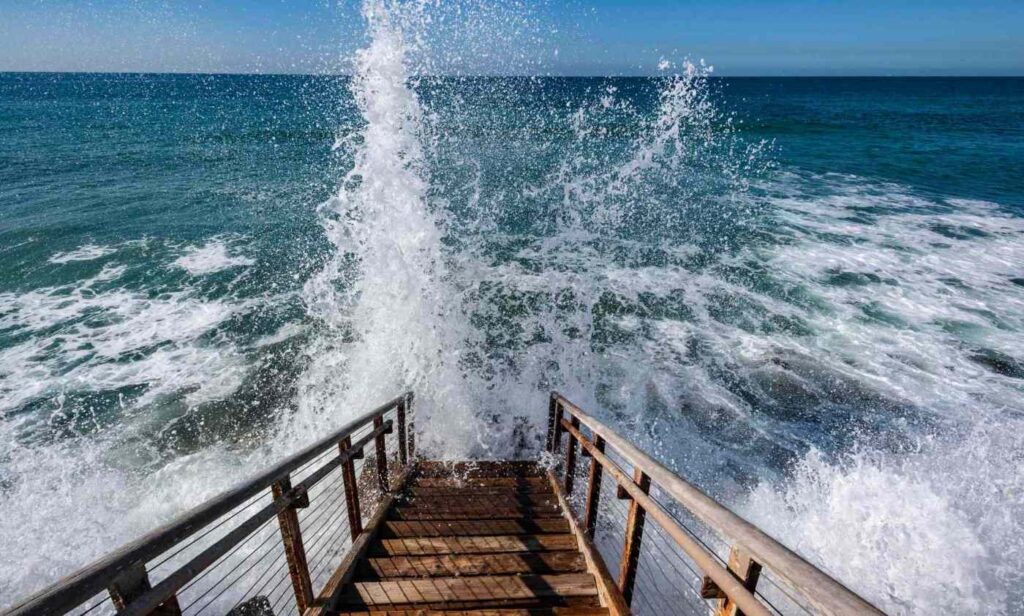
As the state releases a seventh round of grants to help with climate resiliency, San Clemente is set to get more than half a million dollars to study were its sand erosion is the worst and how it can be addressed.
The California Coastal Commission on Wednesday, March 9, approved $570,000 for the seaside town, one of several that applied for a piece of the $3.4 million pot available this round. The money comes from $31 million earmarked for the Coastal Commission in the state’s 2021 budget.
The existence of sand on a shoreline isn’t just a matter of providing a place for sunbathers to put towels down, it’s a critical buffer between the ocean and infrastructure.
In San Clemente, the funding will allow for ongoing monitoring of its shoreline through 2025 and developing a feasibility study for natural ways to protect its sand reserves.
With no beach left, a wave crashes against the rocks and stairs just below the railroad tracks in San Clemente on October 20, 2021. San Clemente last year approved a Coastal Resiliency Plan aimed at helping the city with long-range planning and guidance to address future potential sea-level rise and coastal erosion and on March 9, 2022 received a grant from the state to study. (Photo by Mark Rightmire, Orange County Register/SCNG)
The city’s shore in recent years has suffered severe erosion in some areas, to the point the sand disappears during high tides along its north coast adjacent to a popular beach path and damage done to railroad tracks last year had to be repaired on the south end.
A seawall had to recently be built to protect the lifeguard headquarters near the pier, and the building may need to be moved to higher ground.
The city is hoping for millions in federal funding for a major sand replenishment project 20 years in the planning, which would span from Linda Lane to T Street Beach.
The San Clemente Shoreline Project would add a 50-foot-wide berm along 4,500 feet of shoreline north and south of the San Clemente Pier using 250,000 cubic yards of sand, to be nourished every six years by the U.S. Army Corps of Engineers.
While those funds are still awaiting approval, the grant money awarded by the Coastal Commission will help to monitor and document ongoing issues and find other trouble spots that need to be addressed.
In the fall and spring each year, the condition of the city’s public beaches would be documented to establish a baseline to compare against future sea level rise impacts.
City officials say they are in discussions with partners to establish a “regional shoreline management working group” to “collaborate, cost share and implement regional coastal resiliency solutions,” with a meeting planned in coming months.
Officials also expect to use a portion of the funding to develop plans for more natural ways of adapting to the affects of climate change and sea level rise, such as maybe recreating a coastal dune system.
The city will also establish funding for coastal resiliency programs and projects and evaluate the benefits of re-establishing the city’s “Opportunistic Beach Sand Placement Program” that would allow it to quickly acquire sand supply as it becomes available from outside sources.
Related links
Help wanted: More sand for south Orange County’s shrinking beaches
Manhattan Beach tries to recreate beach dunes to protect against erosion
Can oysters be the answer to eroding shorelines?
How 1 small seaside town is grappling with its beach being swept away by erosion
Are sand erosion and rising seas a concern for San Onofre’s ocean-front nuclear waste storage?
